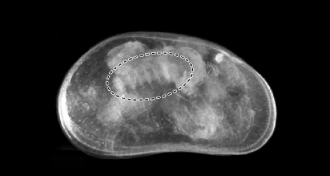Life
Sign up for our newsletter
We summarize the week's scientific breakthroughs every Thursday.
-
 Humans
HumansMaiden shows signs of TB-like infection
Molecular analysis yields clues about the immune system activity of a probable sacrificial victim.
-
 Life
LifePolar bears’ ancient roots pushed way back
Full genetic blueprints suggest the animals split from brown bears millions of years ago.
By Devin Powell -
 Animals
AnimalsTiny creature, giant sperm
Giant sperm appear in various other species, including some flatworms, beetles and a fruit fly species, Drosophila bifurca, with sperm nearly 6 centimeters long.
By Susan Milius -
 Life
LifeFake jellyfish so real it even swims
Constructed of silicone and heart cells, medusoid moves like the real thing.
-
 Life
LifeLittle animals spread sperm for smelly mosses
Sex-specific odors may entice springtails to kick off fertilization.
By Susan Milius -
 Math
MathTest decodes dolphins’ math skills
Dolphins could use mental math to locate prey in clouds of bubbles.
By Meghan Rosen -
 Life
LifeStudy shows where identical twins part ways
By birth, genetic doubles are already using their DNA differently.
-
 Life
LifeInsulin may be Big Antler hormone
Extra sensitivity to the hormone in certain developing tissues might give animals their oversized weapons and ornaments.
By Susan Milius -

-

-
 Life
LifeSkinny searchers keep fat ants full
By controlling movement out of an ant nest, researchers discover that ants weigh tubbiness in deciding who hunts for food.
By Meghan Rosen -
 Life
LifeYoung flies cannibalize the plump
An evolutionary biologist’s modest proposal shocks colleagues who thought they knew everything about their favorite laboratory organism.
By Susan Milius